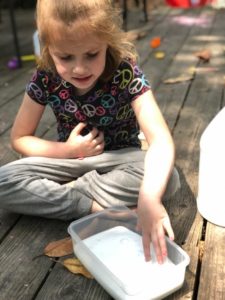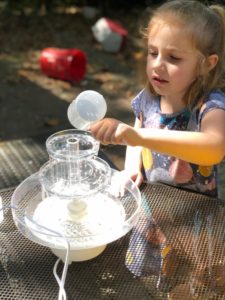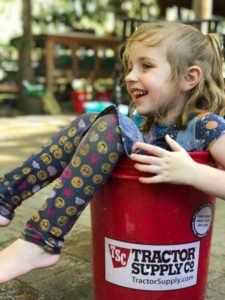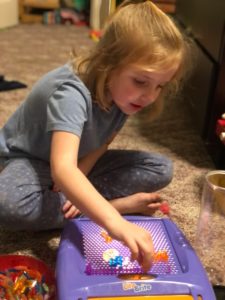No assignments. No lectures. No homework. No tests. No grades. No academic work required, ever. Children are allowed to do as they will with their time. There are rules that are in place for practical reasons, but within those rules kids are allowed to do literally whatever they want. Screen time all day long? Go for it. Sit and stare at the wall for hours on end? You do you, kid.

My introduction to this educational model came as an absolute shock. It violated absolutely everything I’d ever understood about education. And I learned about it in the strangest place – sitting in a college classroom, studying education. The class was a survey course. An overview of how education works in America. In a series of lectures, we learned about a wide range of different models of education – traditional, Montessori, Reggio, that sort of thing. For each one, the professor introduced the educational model, gave us a brief overview of the philosophies and practices, and then went over what research shows us about the effectiveness of the method.
I was dutifully taking notes and committing what I was learning to memory when we reached the “Free school” model, used by Sudbury-style schools and unschoolers. As the teacher described what this sort of education consisted of, or rather what it lacked, my brain ran right off the rails in shock. What she was describing was not education. Not in any sense that I understood it. It was something else entirely. I was shocked that it was legal, much less being presented formally, just one of many methods of education.
The cognitive dissonance this college lecture threw me into was almost painful. I had poured a lot of time and resources into my study of education. I was committed. I was spending my days learning about how to teach with worksheets, and tests, and carefully structured lesson plans that promote a specific learning outcome. And I was working from the deep belief that all of these things were necessary and important. That kids would suffer without them, would fail to reach their full potential, that sort of thing. Just hearing that this ‘free’ model exists and is considered a valid form of education suddenly had me questioning that really basic belief. I waited, anxiously, for the relief from my cognitive distress that I fully believed was coming. I waited for the professor to describe the disastrous outcome of this non-education model. I wanted to hear how kids “educated” in this way struggled as adults. How they had trouble keeping jobs, or getting accepted into college. Surely, there was some massive downside. There had to be.
But, relief was not to come that day. Much the opposite. The professor explained how this model resulted in better adult outcomes. That kids raised this way are somewhat less likely to apply to college, but those that choose to apply have higher acceptance rates, and do better in college when they get there. They’ve been accepted to a huge range of different colleges, including Ivy League schools. They graduate from college at higher rates. And they are more likely to find employment in their chosen field. The professor concluded by explaining that, even though the outcomes are better than other models of education, that doesn’t necessarily mean free school is a better model. Kids educated in this manner tend to come from higher socioeconomic status families, and the difference may arise from that.
I was floored. Evidently, this ‘not-education’ form of education was a valid option. This realization changed everything about how I completed my studies on education. Suddenly, I was questioning all of the practices I was being taught. I didn’t want to know just what to do, I wanted to know what to do and why. What do kids actually need to be successful? (A few things). Which of our standard educational practices provide no particular long-term benefit? (Pretty much all of them). And, is there anything we do as part of educating kids in our society that actually impedes their development and growth? (Sadly, yes).
So, here’s my list of what kids actually need to fulfill their personal potential:
1 – Sleep
2 – Play
3 – Adequate nourishment
4 – Outdoor time
5 – Playtime with other children
6 – Conversation and loving interactions with caring adults
7 – Books, and being read to
8 – A variety of tools and materials to play and interact with. Art materials, sensory materials, building materials, tools, swings, bikes and climbing structures, etc.
9 – Lots of time to explore and play with the above materials in an unstructured, open-ended manner
10 – Time with screens and technology, necessary for success in a tech-based society

I consider these elements critical. A lack in any of these areas has been shown to negatively impact a child’s health, development, and future success. But the rest? All the other stuff we expect kids to do all day long? Unnecessary, but mostly harmless. As long as they don’t interfere with the above list, they’re fine things to do if they bring you joy. When you look at the research, they simply don’t have much of a long term effect, positive or negative. But there are a few exceptions. A few of our regular practices have actually been shown to negatively impact our kids. High-stakes testing and reward / punishment systems are a few examples. I recently ran across an interesting question. What if the first rule of medicine (do no harm) also applied to educational systems? Sadly, a lot of things would have to change.

The great irony of my life right now is that after learning what I learned while studying education, I could not stomach the idea of sending my child to school. Our school systems, as they currently stand, require kids to spend far too much time engaging in activities that I view as either useless or potentially harmful, and not nearly enough time on the critical elements. There are amazing teachers in our school systems, but they currently lack the authority to override the system and provide kids with what they really need.

So, I’m unschooling. I’m filling Cat’s days with play, time in the sun, plenty of activities and materials to explore as she will, and as much screen time as she cares to consume. It’s peaceful and happy, and she just learns and learns and learns. It’s not anything I ever imagined educating my kid could look like, but never in a million years would I ever go back.


